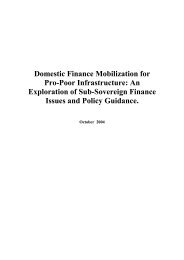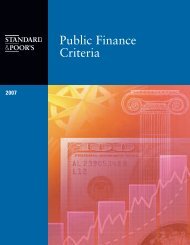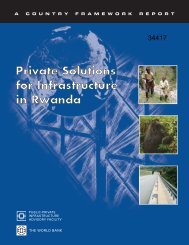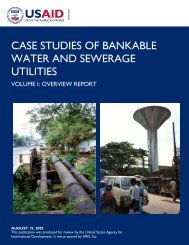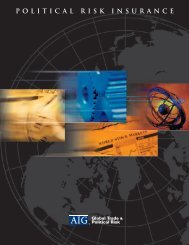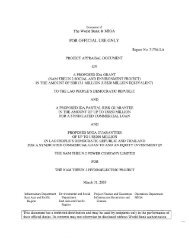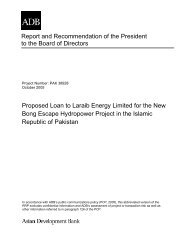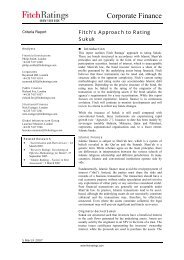EAP - The Pacific Infrastructure Challenge - World Bank (2006).pdf
EAP - The Pacific Infrastructure Challenge - World Bank (2006).pdf
EAP - The Pacific Infrastructure Challenge - World Bank (2006).pdf
You also want an ePaper? Increase the reach of your titles
YUMPU automatically turns print PDFs into web optimized ePapers that Google loves.
<strong>Pacific</strong> countries are grappling with regional issues more resolutely than for many<br />
years, but there is still a long way to go before the region can be held up as a best<br />
practice example of regional cooperation or integration.<br />
<strong>The</strong>re are however real opportunities for international donor agencies to “piggyback”<br />
on the work of the Forum and seek to establish workable relationships with<br />
the Secretariat as a way of getting better coordination of infrastructure investment<br />
policies. Indeed, there is a clear confluence of interests between the donor agencies<br />
and the countries of the region to formulate a consistent and transparent policy<br />
framework for building, operating and funding infrastructure on a sustainable basis<br />
for the region, with common principles and governance arrangements.<br />
<strong>The</strong>re is also scope for regionalizing the regulatory framework for infrastructure<br />
assets, either in the form of a support agency to assist in building and retaining the<br />
human capacity of the regulatory institutions in each country, or to actually operate<br />
across countries as the infrastructure regulator for the region.<br />
Box 7.9: ECTEL – Regulatory Cooperation in Eastern Caribbean States<br />
<strong>The</strong> Eastern Caribbean Telecommunications Authority (ECTEL) was established<br />
as a regional telecommunications regulatory advisory body by the Governments of<br />
five Eastern Caribbean states (Dominica, Grenada, St Kitts and Nevis, St Lucia<br />
and St Vincent and the Grenadines). ECTEL’s responsibility is to coordinate the<br />
approach to telecommunications regulation in each member state. It works closely<br />
with telecommunications regulators and governments in each state, advising them<br />
on: regional policy, types of telecommunications services, licensing, fees, pricing,<br />
management and provision of universal service. <strong>The</strong> National<br />
Telecommunications Regulatory Commissions (NTRC) are the<br />
telecommunications regulators in each of the five member states. Each of these<br />
Commissions have five commissioners appointed by the Minister as well as<br />
varying levels of technical staff. <strong>The</strong> diagram illustrates the ECTEL’s structure<br />
(left) and its relationship with the NTRCs:<br />
Council of<br />
Ministers<br />
Board of<br />
Directors<br />
Directorate/<br />
Secretariat<br />
NTRC<br />
St Lucia<br />
NTRC<br />
St Vincent<br />
NTRC<br />
St Kitts & Nevis<br />
NTRC<br />
Dominica<br />
Council of Ministers: This group is made up of the<br />
Ministers responsible for telecommunications in the<br />
ECTEL states and the Director General of the OECS.<br />
Board of Directors: One member from each member state<br />
appointed by the Minister for a year<br />
NTRC<br />
Grenada<br />
Directorate/Secretariat: Managing Director, Professional,<br />
Technical and Support Staff<br />
ECTEL has helped with early termination of monopoly licenses, introduction of<br />
competition, and setting cost based tariffs and interconnection charges. Regional<br />
cooperation in regulation has enabled ECTEL member countries to manage<br />
scarce resources efficiently and leverage the inter-member country networks<br />
efficiently resulting in increased flexibility. ECTEL’s existence has provided a<br />
basis for a strong, unified approach to attracting investment and competition into<br />
the region. Rates for telecommunications services have begun to fall, applications<br />
for operating licenses are being processed and applications for the establishment<br />
of call centers have been received. Where possible, ECTEL endeavors to enact<br />
identical regulations in member states and to implement them consistently. This<br />
has reduced the burden on individual regulators and has helped to attract<br />
investment.<br />
Source: Castalia Research<br />
59



